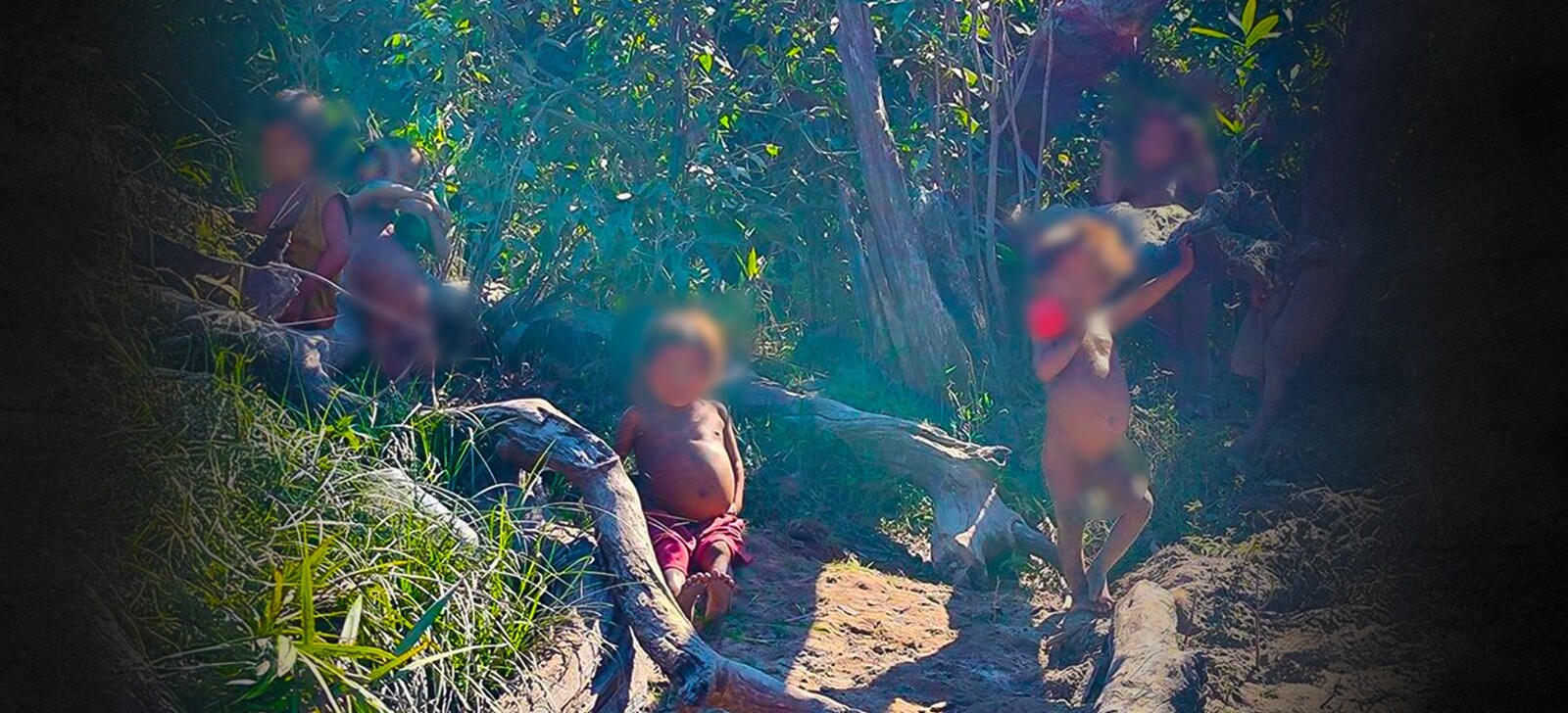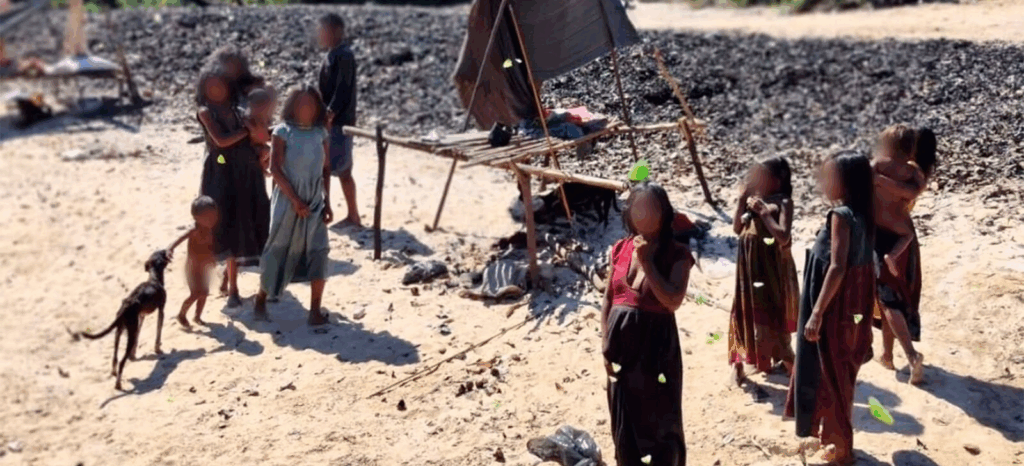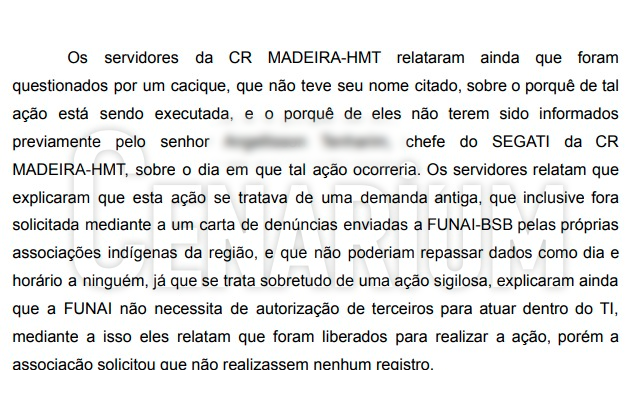Closure of indigenist posts exposes peoples of recent contact to risks of invasion and violence in the Amazon
26 de September de 2025

By Fred Santana – From Cenarium
MANAUS (AM) – Documents prepared by the Madeira-Purus Ethno-Environmental Protection Front (FPE-MadPur), linked to the National Foundation for Indigenous Peoples (Funai), confirm a scenario of neglect and vulnerability involving the Pirahã people, in the Madeira River region, in addition to pointing to crimes such as illegal logging in southern Amazonas. The official letters, obtained exclusively by CENARIUM MAGAZINE, also reveal that Indigenous leaders linked to the Ministry of Indigenous Peoples (MPI) were allegedly pressuring Funai officials responsible for monitoring these crimes.
The information recorded in letters sent to different bodies, including the Federal Public Prosecutor’s Office (MPF), reinforce the complaint reported to the newsroom by a professional who worked in the defense of the Pirahã people’s rights. According to her, social programs intended for the Indigenous were not being accessed by the community, and benefit cards remained under the control of third parties. The documents also mention a “collapse” after the closure of Funai bases in the region in June 2024, under the Lula government.

To survive, the Pirahã have resorted to collecting food outside their territory, a situation that has generated tension with neighboring communities and already resulted in episodes of violence. The most recent case was recorded in September this year, in the surroundings of the Maici River, in Humaitá (AM), when a worker was killed and another injured.
The first report, entitled “Madeira PCA Report”, covers the period from June to August 2024 and describes the worsening of the situation after the closure of the Access Control Posts (PCAs) in the Pirahã and Juma Indigenous Territories, by decision of the Funai Madeira Regional Coordination. The justification presented was lack of resources. However, technicians from the Ethno-Environmental Protection Front (FPE) recorded that there was budget available, but without proper application.
The document also cites the precariousness of facilities, absence of health policies, and reports of illegal logging within the Pirahã territory. According to the team, the closure of the PCAs left the Indigenous exposed to invasions, hunger, and risk of massacres. The report also recorded sightings of isolated Indigenous in the Maici River region.
“The team assesses that, to obtain more concrete data, it is necessary to carry out expeditions throughout the territory to verify the reports, especially considering the proximity of the possible sighting location to private properties, as well as other Indigenous territories, such as the Jiahui and the Parintintin. The area is also in continuous use by the Pirahã, which makes reading traces of isolated peoples difficult to carry out,” says a passage of the document.
The second report, sent to the Federal Public Prosecutor’s Office (MPF) between July and September 2024, presents the emergency measures adopted after determination by the Territorial Protection Directorate (DPT) to reestablish the protection bases. Among the actions were the installation of community fields to guarantee food security and initiatives in the health area. Still, assistance remained insufficient, marked by the absence of doctors and difficulties in evacuating Indigenous in situations of risk.
Illegal logging
Another document obtained by CENARIUM is a Funai letter, dated July 22, 2024, evidencing the seriousness of the situation faced by monitoring teams in the Pirahã Indigenous Territory. The document records reports of illegal logging and mining, in addition to reporting intimidation suffered by officials during monitoring operations.

According to official letter 252/2024/CFPE-MadPur, dated July 17, 2024, the team from the Alto Maici Control and Monitoring Post (PCA) was informed about the arrival of members from the Funai Madeira Regional Coordination, with the objective of carrying out a monitoring operation in the Pirahã territory, with logistical support from the post. During the action, photographic records confirmed the presence of illegal logging, a practice already documented in previous Funai processes.
Pressure on officials
The document reports that officials were approached in four different locations within the Pirahã Indigenous Territory. A chief, whose name was not mentioned, questioned the lack of prior notice about the operation and demanded justifications. The inspectors explained that the action was based on reports sent by Indigenous associations to Funai’s headquarters in Brasília and emphasized that monitoring operations have a confidential nature.

Despite being authorized to continue the inspection, the agents were “instructed” not to make records during the action. They reported that logging and mining are advancing “at full speed” in the region, recommending a new, more robust and integrated operation, with enforcement authority and increased security. The letter warns that the lack of institutional coordination puts the integrity of the teams at risk, exposing officials to direct threats.
The document indicates that the pressure represented direct intimidation, creating an environment of insecurity for inspectors. According to the report, such pressures would also have been exerted by Indigenous leaders linked to the Ministry of Indigenous Peoples (MPI), who expressed dissatisfaction with the conduct of operations, especially for requiring prior notice. The officials reinforced that confidential actions are essential to combat crimes such as illegal logging and mining.
In addition, protection teams recorded new reports of logging and reported that, due to hunger, Indigenous are committing thefts in neighboring communities, increasing local tension. The report also describes threats suffered by Funai officials and partners, who became targets of pressure from loggers and local leaders. According to the whistleblower heard by the newsroom, reports and requests for support prepared by the FPE were neglected, while processes related to community protection remain stalled at the Federal Public Prosecutor’s Office (MPF).

Noncompliance with Supreme Federal Court ruling
The documents also mention the noncompliance with ADPF 709, a ruling by the Supreme Federal Court that obliged the federal government to adopt sanitary and territorial protection measures during the COVID-19 pandemic. The determination required sanitary barriers, removal of invaders, and guaranteed access to the Unified Health System (SUS) for all Indigenous peoples, measures that were not maintained after the closure of the PCAs.
As a result, the Pirahã people, considered of recent contact, continue to live in a situation of extreme risk. The combination of invasions, hunger, absence of effective public policies, and pressure from external actors aggravates the vulnerability of a community that, even after more than two centuries of contact, maintains traditional practices and struggles to survive in its territory.
The newsroom chose not to publish the documents obtained in full, as they contain sensitive data on officials who worked in the region.
Position of the authorities
In a note to CENARIUM, the Ministry of Indigenous Peoples (MPI) stated it had no knowledge of the alleged threats to Funai officials. The Ministry informed that it monitors the situation of the Pirahã people and coordinates the national situation room of ADPF 709. Regarding the Access Control Posts (PCAs), the MPI explained that they were measures instituted during the pandemic to protect Indigenous rights and that currently the Pirahã Indigenous Territory has an Ethno-Environmental Protection Base in the Lower Maici region, ensuring continuity of protection even after the discontinuity of the PCAs. Regarding conflicts, the MPI informed that it monitors the context through the General Coordination of Indigenous Peoples of Recent Contact, together with the Department of Mediation and Conciliation of Indigenous Conflicts (Demed).
Funai also issued a statement, affirming that the incident on July 17, when a man was allegedly killed by Pirahã Indigenous, is under investigation. The agency said it is taking all necessary steps to gather information from the community and reinforce security in the area. Regarding the closure of the PCAs, Funai justified that the measure aimed to “build greater specificity in ethno-environmental protection and in the socio-cultural rights of the Pirahã, as they are a people of recent contact,” in addition to adjusting access to social benefits.
CENARIUM also contacted the Federal Public Prosecutor’s Office (MPF) for clarification on the complaints and official reports regarding the situation of the Pirahã people, but received no response until the closing of this edition.

